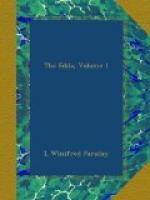(1) Poetic Edda.—The classic edition, and on the whole the best, is Professor Bugge’s (Christiania, 1867); the smaller editions of Hildebrand (Die Lieder der Aelteren Edda, Paderborn, 1876), and Finnur Jonsson (Eddalieder, Halle, 1888-90) are also good; the latter is in two parts, Goettersage and Heldensage. The poems may also be found in the first volume of Vigfusson and Powell’s Corpus Poeticum Boreale (Oxford, 1883), accompanied by translations; but in many cases they are cut up and rearranged, and they suffer metrically from the system adopted of printing two short lines as one long one, with no dividing point. There is an excellent palaeographic edition of the Codex Regius of the Elder Edda, by Wimmer and Finnur Jonsson (Copenhagen, 1891), with photographic reproductions interleaved with a literal transcription.
(2) Snorra Edda.—The most recent edition of the whole is Dr. Finnur Jonsson’s (Copenhagen, 1875). There is a useful edition of the mythological portions (i.e., Gylfaginning, Bragaraedur, and the narrative parts of Skaldskaparmal) by Ernst Wilken (Die Prosaeische Edda, Paderborn, 1878).
(3) Dictionaries and Grammars.—For the study of the Poetic Edda, Gering’s Glossar zu den Liedern der Edda (Paderborn, 1896) will be found most useful; it is complete and trustworthy, and in small compass. A similar service has been performed for Snorra Edda in Wilken’s Glossar (Paderborn, 1883), which forms a second volume to his edition, mentioned above. Both are, of course, in German. The only English dictionary is the lexicon of Cleasby and Vigfusson (Oxford).
Of Grammars, the best are German; those of Noreen (Altnordische Grammatik, Halle, 1892), of which there is an abbreviated edition, and Kahle (Altislaendisches Elementarbuch, Heidelberg, 1896) being better suited for advanced students; the English grammars included in Vigfusson and Powell’s Icelandic Reader (Oxford) and Sweet’s Icelandic Primer (Oxford) are more elementary, and therefore hardly adequate for the study of the verse literature.
II. Translations.
There are English translations of the Elder Edda by Anderson (Chicago, 1879) and Thorpe (1866), as well as the translations in the Corpus Poeticum, which are, of course, liable to the same objection as the text. The most accurate German translation is Gering’s (Leipzig, 1893); in Simrock’s (Aeltere und Juengere Edda, Stuttgart, 1882), the translations of the verse Edda are based on an uncritical text. Snorra Edda was translated into English by Dasent (Stockholm, 1842); also by Anderson (Chicago, 1880).
III. Modern Authorities.
To the works on Northern mythology mentioned below in the note on the Baldr theories, must be added Dr. Rydberg’s Teutonic Mythology (English version by R.B. Anderson, London, 1889), which devotes special attention to Saxo.




